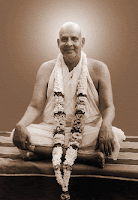Verse 24
Alike in pleasure and pain, who dwells in
the Self, to whom a clod of earth, stone and gold are alike, to whom the dear
and the unfriendly are alike, firm, the same in censure and praise
Loshta-Ashma-Kaanchana: Whether he sees a nugget of gold or a
big boulder of granite, it makes no difference to him. A clod of earth and a ball
of gold have the same value to the eye of this great soul who has transcended
the operation of the three gunas.
“clod, stone or gold”. The three items are
carefully chosen – there is one from each Guna,
representing Tamas, Rajas and Sattwa respectively.
Whether a person considers the Jnani to be dear to him or not; whether
he censures or praises the Jnani; in
both cases the Jnani always considers
that person as being a human being to be unconditionally loved and praised.
This is not to say that the Jnani is unmindful of the value of gold, or a dear friend, or an
insult, etc. It is just that his response to them is not determined by his ego.
He responds, but from a selfless standpoint.
Verse 25
The same in honour and dishonour, the
same to friend and foe, abandoning all undertakings—he is said to have crossed
the qualities.
The same remarks apply when the person shows
honour or dishonour to the sage; or whether he considers the sage as a friend
or a foe. To the Jnani he is worthy
of honour and always a friend unconditionally.
Praise and
censure mean the same thing. It makes no difference to such a person whether he
is glorified or condemned.
Tulyo mitrāripakṣayoḥ: Let a friend come or let an enemy come; there is no difference.
Sarvārambhaparityāgī: He will still do nothing. He will be like a kutastha. He will be seated calm and quiet in himself, as if the world does not
exist at all for him. Such a person is a gunatita, one who has transcended the operation of the three gunas.
Combining the
essence of both the above verses, it is worthwhile to go through the
description of a Jivanmukhta in
Jivanmukti Viveka, written by Sage Vidyaranya.
The Jivanmukta is one for whom this
phenomenal world, in which he moves and acts, has ceased to exist. In the case
of an ordinary person, his mind reacts to the various forms in the world and
gives him knowledge of their variety and their differences from one
another.
But the mind of
the Jivanmukta does not get so
transformed and so he does not see differences, but sees all forms only as
Brahman. In deep sleep the mind does not undergo any transformation, but the
seed for transformation remains. So sleep cannot be equated with the state of Jivanmukti.
The Jivanmukta remains unaffected by both
pleasure and pain. He is not elated by something good happening, nor is he
depressed when a calamity occurs.
He does not crave
for anything, but subsists on whatever comes of its own accord. Though his
senses function and can experience everything, his mind is absolutely calm and
does not react to anything.
Though his eyes
see everything before him, his mind does not judge them as good or bad,
favorable or unfavorable and so he is free from agitation and attachment or
aversion. The senses themselves do not cause any harm. It is the mind which
judges what is experienced by the senses and develops likes and dislikes in the
case of an ordinary person. Since the mind of the Jivanmukta does not make any such judgment, he is free from all
attachment and aversion.
Because of the
absence of transformation of the mind, the Jivanmukta
is free from Vasanas. His mind always
remains pure. He never looks upon himself as a doer of actions since he does
not identify himself with the body-mind complex which alone performs all
actions.
Consequently he is neither elated nor depressed by the good or bad results of the actions. Others do not have any reason to fear him, because he never insults or harms others in any way. He is also not afraid of any one. He remains unaffected even if some wicked man insults or harasses him. He does not distinguish people as friend or foe. Though full of learning, he never exhibits it.
Consequently he is neither elated nor depressed by the good or bad results of the actions. Others do not have any reason to fear him, because he never insults or harms others in any way. He is also not afraid of any one. He remains unaffected even if some wicked man insults or harasses him. He does not distinguish people as friend or foe. Though full of learning, he never exhibits it.
This coolness is
due not only to his freedom from worry, but also to his awareness of the
fullness of his own Self. These are the characteristics of the Jivanmukta.







No comments:
Post a Comment